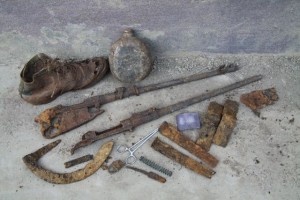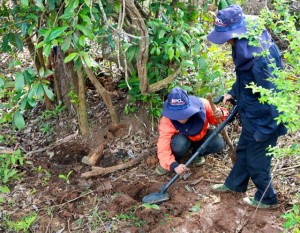Project Sekong 2012: Occasionally, as we dig we find bodies of soldiers. But we need to continue our search for ordnance.

After forty years of weathering it would be unusual for us to find human remains, but when we find equipment like rifles, canteens, boots and belt buckles together, its likely that a soldier or porter died in that place. Its difficult for our deminers to search such areas but we need to make certain that UXO is not also on the site.
Report 23
A couple of our deminers did a poor job of clearance yesterday and made a mistake that could have had tragic consequences. There’s an explanation for what happened but that’s all I’ll term it — an explanation, not an excuse.
Our two female deminers were assigned to search a garden next to a small fishpond. Both the pond and the garden are on land that has never been cleared of ordnance but has been cultivated anyway. Lately, we’ve been searching similar well-worn places. While those sites have already been disturbed, we think it wise to search for UXO that might still be hidden in the soil, perhaps just below the current plowing depth.
Yai received a tip that near a large tree in the center of the site, a woman, now deceased, once sighted suspicious objects. Villagers who heard that woman’s report wisely declined to explore and for many years the area has remained undisturbed.
The deminers checked the ground under the tree with their detectors and immediately got a signal that merited excavation. Soon, they had an aluminum canteen in hand. Then, they unearthed a rifle. Next, a pair of leather boots, badly rotted, but clearly military issue. Things were taking an eerie turn: We find canteens. We find rifles. We find boots. But when we find that much gear in one place it usually means we’ve come across the body of a soldier killed in action.
The deminers conferred and together decided that enough was enough. They pronounced the site cleared, packed up their gear and moved to a new location. Later in the day, Yai and I discussed the deminer’s reaction the relics they’d unearthed. We had a nagging suspicion that the two deminers, known among the team to be deathly afraid of ghosts, had left the site before completing a thorough job.
At the end of the day, I asked Chomrong, our Team Leader, to take the team back to the site and do a “QA” or, “quality assurance” check on the area around the tree. Yai echoed my concerns and Chomrong readily agreed.

After addressing the deminer's discomfort with the site, the search resumed. We found more personal items, but luckily, no grenades or other ordnance.
The re-examination immediately indicated that there was more refuse in the soil. Within minutes we had in hand another rifle (this one with a chambered round) a belt buckle, metal handles from a storage box, a pair of forceps, and other bits and bobs that only someone with Vietnam War era military experience will be able to identify.
What I feared the deminers might have missed was ordnance that a soldier (or porter) would likely have carried into combat or down the trail: hand grenades, riffle cartridges, artillery shells and the like. (Porters carrying supplies down the Ho Chi Minh Trail typically carried a bundle of four rifles or the equivalent weight in ammunition). I didn’t want a cache of grenades, shells, rockets or mortars left behind in a parcel of land that we were set to declare safe.
The two deminers are both from an ethnic group called the Laven, from families that practice a combination of animism and ancestor worship. Earlier in this project, they voiced concern over having to work near burial sites or to camp near a clinic in which people may have died. They’re both spooked by sounds in the night or events that might be attributed to the supernatural.
Their failing yesterday had nothing to do with gender. Male deminers from the same cultural background and religious training would doubtlessly have behaved in the same manner: work quickly and ignore any indications that would require lingering at the site.
While a couple of deminers failed to perform up to standard, our team as a whole did well. We conducted proper quality assurance, caught a mistake, and corrected the situation. Still, it was a close call and the fact that no potentially lethal ordnance was found does not negate the significance of the lapse.
